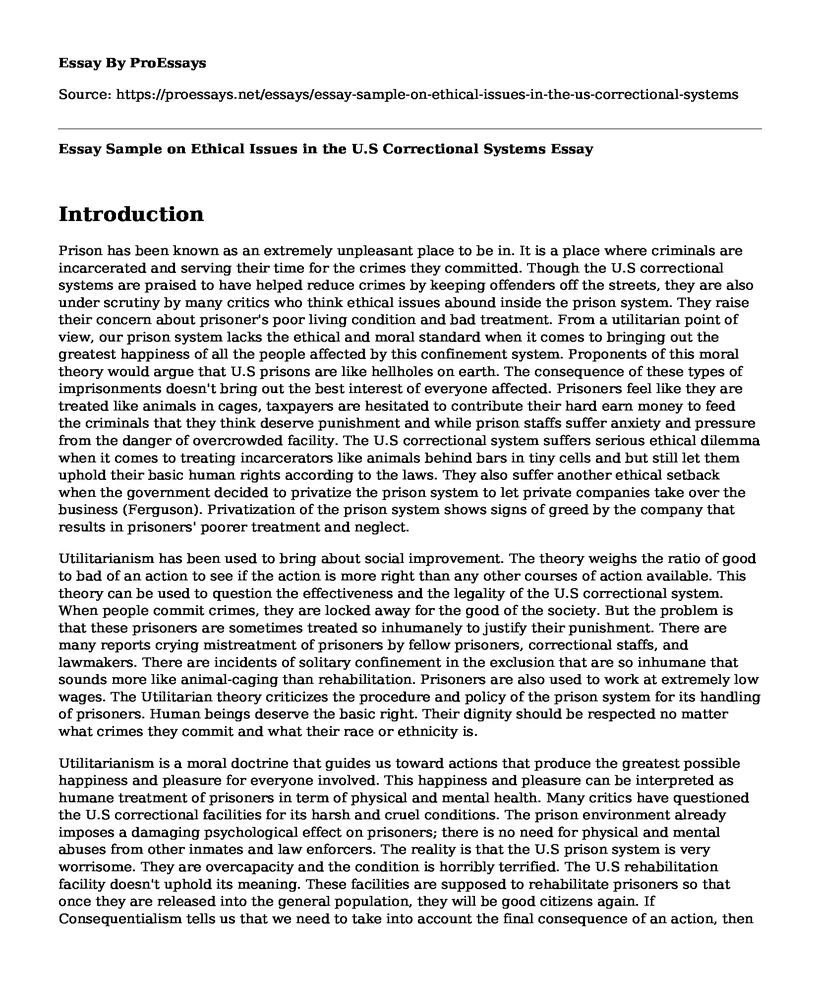Introduction
Prison has been known as an extremely unpleasant place to be in. It is a place where criminals are incarcerated and serving their time for the crimes they committed. Though the U.S correctional systems are praised to have helped reduce crimes by keeping offenders off the streets, they are also under scrutiny by many critics who think ethical issues abound inside the prison system. They raise their concern about prisoner's poor living condition and bad treatment. From a utilitarian point of view, our prison system lacks the ethical and moral standard when it comes to bringing out the greatest happiness of all the people affected by this confinement system. Proponents of this moral theory would argue that U.S prisons are like hellholes on earth. The consequence of these types of imprisonments doesn't bring out the best interest of everyone affected. Prisoners feel like they are treated like animals in cages, taxpayers are hesitated to contribute their hard earn money to feed the criminals that they think deserve punishment and while prison staffs suffer anxiety and pressure from the danger of overcrowded facility. The U.S correctional system suffers serious ethical dilemma when it comes to treating incarcerators like animals behind bars in tiny cells and but still let them uphold their basic human rights according to the laws. They also suffer another ethical setback when the government decided to privatize the prison system to let private companies take over the business (Ferguson). Privatization of the prison system shows signs of greed by the company that results in prisoners' poorer treatment and neglect.
Utilitarianism has been used to bring about social improvement. The theory weighs the ratio of good to bad of an action to see if the action is more right than any other courses of action available. This theory can be used to question the effectiveness and the legality of the U.S correctional system. When people commit crimes, they are locked away for the good of the society. But the problem is that these prisoners are sometimes treated so inhumanely to justify their punishment. There are many reports crying mistreatment of prisoners by fellow prisoners, correctional staffs, and lawmakers. There are incidents of solitary confinement in the exclusion that are so inhumane that sounds more like animal-caging than rehabilitation. Prisoners are also used to work at extremely low wages. The Utilitarian theory criticizes the procedure and policy of the prison system for its handling of prisoners. Human beings deserve the basic right. Their dignity should be respected no matter what crimes they commit and what their race or ethnicity is.
Utilitarianism is a moral doctrine that guides us toward actions that produce the greatest possible happiness and pleasure for everyone involved. This happiness and pleasure can be interpreted as humane treatment of prisoners in term of physical and mental health. Many critics have questioned the U.S correctional facilities for its harsh and cruel conditions. The prison environment already imposes a damaging psychological effect on prisoners; there is no need for physical and mental abuses from other inmates and law enforcers. The reality is that the U.S prison system is very worrisome. They are overcapacity and the condition is horribly terrified. The U.S rehabilitation facility doesn't uphold its meaning. These facilities are supposed to rehabilitate prisoners so that once they are released into the general population, they will be good citizens again. If Consequentialism tells us that we need to take into account the final consequence of an action, then the consequence of imprisonment of convicts may even involve seriously bad treatment to satisfy a consequentialist. The consequentialists don't even bother to care how the prisoners are treated, as long as the result is to enforce the laws of the land.
Conclusion
The current U.S prison system fails in many ways to make everyone happy, except a few. Harsh and cruel Imprisonment doesn't transform inmates into better citizens. Lack of oversight for prisons' wellbeing put everyone at risk. The society carries a bigger burden as a result. These disturbing facts perplex many utilitarian who thought prison system is meant to bring the best for everyone involved.
Reference
Ferguson, Heather. "Ethical Issues in the United States, Irish, Scottish and British Prison Systems ." Western Illinois University, 25 Mar. 2018, www.wiu.edu/coehs/leja/.../2Article%20Heather%20Ferguson%20May%202009.docx.
Cite this page
Essay Sample on Ethical Issues in the U.S Correctional Systems. (2022, Apr 16). Retrieved from https://proessays.net/essays/essay-sample-on-ethical-issues-in-the-us-correctional-systems
If you are the original author of this essay and no longer wish to have it published on the ProEssays website, please click below to request its removal:
- Research Paper on the Current Status, Requirements, and the Future of Insurance Exchange
- What Inspires a Man to Seek to Do Good Instead of Evil? Paper Example
- Violence in America - Essay Sample
- Essay on Sexual Assault in England and Wales: Worrying Reduction in Reported Cases
- Essay Sample on Boeing Credit Card Fraud
- Crime Levels and Criminal Justice: A Study of Factors and Consequences - Essay Sample
- 9/11: Global Security Debate in the Aftermath - Essay Sample







